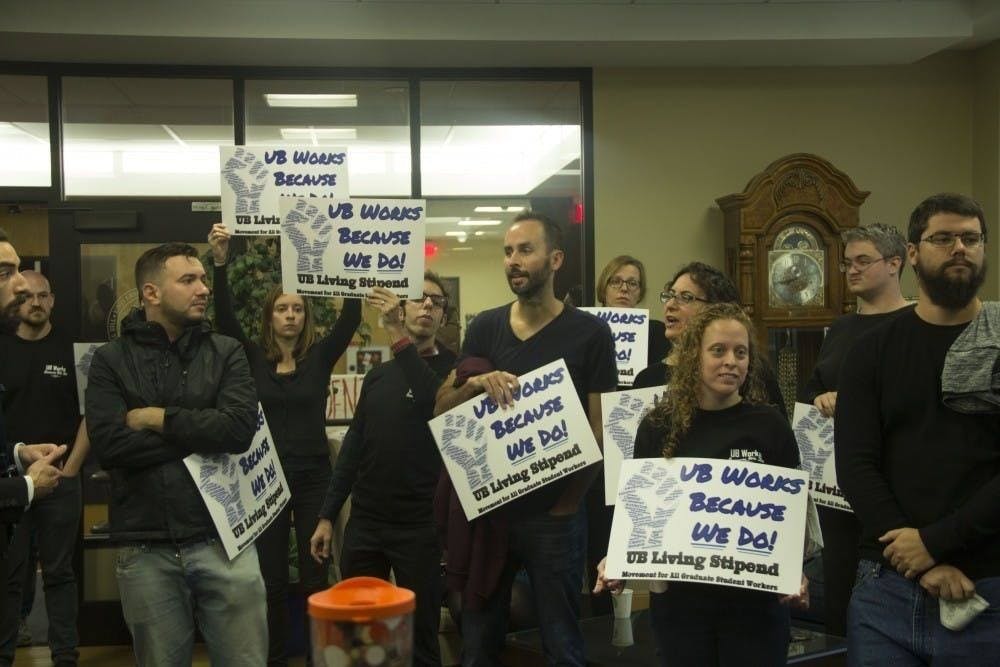UB spends over $23 million more on administrative salaries than the average of their “peer institutions,” according to an accounting professor’s independent financial analysis report.
The analysis, conducted by Eastern Michigan University’s Howard Bunsis, found roughly 13% of the money UB spends on salaries is on upper administration. It also cites faculty salaries are $20,615 less than the average at peer institutions and found UB had a 22% decrease in the number of assistant professors it hired between 2009 and 2020. The report calls UB’s financial reporting “less transparent” than any of the over 100 universities Bunsis has examined over the last 15 years.
The analysis comes roughly one year after the UB Living Stipend Movement commissioned Bunsis to determine UB’s “financial condition and situation.” Bunsis analyzed UB’s “actual financial results” instead of its budgets and compared UB to schools it considers “peer institutions.” The 12 public AAU institutions are University of California San Diego, University of California Los Angeles, University of Arizona, University of North Carolina at Chapel Hill, Rutgers University, University of Iowa, University of Wisconsin-Madison, Pittsburgh University, Stony Brook University, University of California Irvine, University of Michigan, University of Washington. LSM members said Bunsis’ figures revealed that “UB is not prioritizing its research mission.”
“It is clear that there should be less spending on administration and more spending on the core mission,” Bunsis wrote in an email.
But UB spokesperson Kate McKenna says Bunsis’ report is based on his “perspective” and that UB received a copy of the report and is reviewing it.
“What we do know is that the conclusions and assumptions Mr. Bunsis has reported are based on his perspective, using only publicly available online data, and without communicating with university administration,” McKenna wrote in an email. “The report is drawn from past fiscal years and is not knowledgeable of or reflective of budget planning or economic forecasts of the university.”
Bunsis explained in the report that his analysis relied on “actual financial results” because analyzing budgets is “not the best way to make the assessment” and that UB’s recent budgets are not publicly available.
“Trying to rely on budgets to assess the financial health of an institution is not the best way to make the assessment,” Bunsis wrote. “... In addition, if there was a 2019-20 budget for UB that was publicly available, I would analyze it. However, it is not publicly available, and neither are prior budgets.”
“The lack of publicly available financial information for UB is unlike any of the roughly 100 public universities I have examined. This lack of transparency is alarming.”
Mike Montoro, a mathematics Ph.D. student and the UB Council’s student representative, said “the two most important numbers” are administrative salaries ($23.5 million higher than UB’s “peers’” average) and the decrease in assistant professor hires (22% from 2013-19).
“Those two numbers to me show a university more concerned with the ‘look’ and ‘managing’ of excellence than the core values it takes to get to that point,” Montoro wrote in an email. “It shows what LSM [has] wondered, but never been able to certifiably say all along: that UB can pay for a living wage for [graduate assistants], invest in the educational mission of the university and make this university a better place to live and work. But administration just doesn’t want to.”
McKenna noted that, while independent, Bunsis became involved when UB graduate students “hired” him through a “gofundme fundraiser.”
But Montoro said faculty, alumni, the UUP and the GSEU unions financed Bunsis’ analysis, in addition to contributions from some graduate students.
“Many graduate students at UB can barely pay for food, let alone pay for a financial report by a nationally renowned professor of finance,” Montoro said.
Macy McDonald, the co-chair of LSM and an English Ph.D. student, said Bunsis’ report cannot be “reduced” to his “perspective.”
“Dr. Bunsis’ perspective is informed by his expertise,” McDonald wrote in an email.
Ariana Nash, an English Ph.D. student, wrote in an email that Bunsis’ analysis is based on publicly available data, which she says should be “sufficient.”
“The university statement seems to suggest that using ‘only’ publicly available data is a problematic approach, but as Bunsis’ report notes, such publicly available data is usually sufficient to understand a university’s finances,” Nash wrote in an email. “... The university admits its own attempt to betray the public in suggesting that such data is insufficient for determining the state of the university’s finances.”
Willis McCumber, an English Ph.D. student, said Bunsis’ decision to base the analysis on “actual financial results” is a “strength” of the report and said it allows the community “to infer what the priorities of the upper-level administration are.”
Alexandra Moyen contributed reporting to this story.
Julian Roberts-Grmela is a senior news editor and can be reached at julian.grmela@ubspectrum.com and on Twitter @GrmelaJulian.

Julian Roberts-Grmela is a senior news editor for The Spectrum and an English and philosophy major. His favorite book is “White Teeth” by Zadie Smith and he hopes that one day his writing will be as good as hers.





